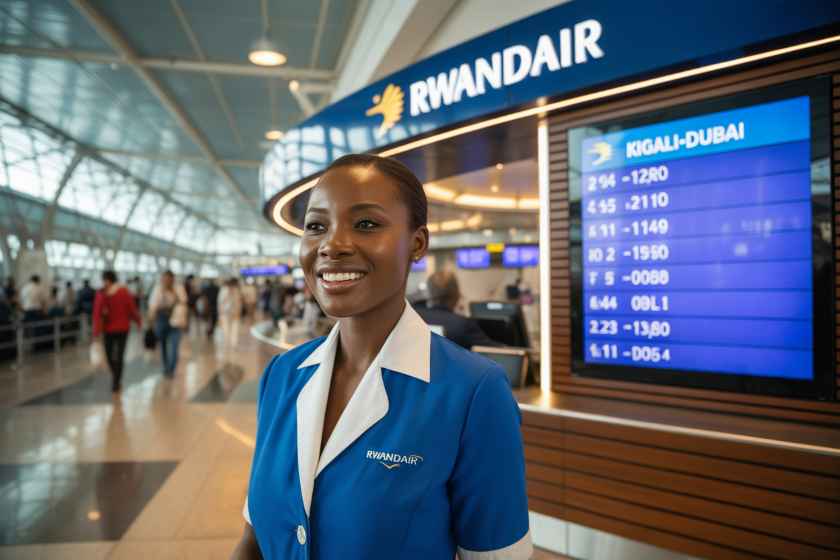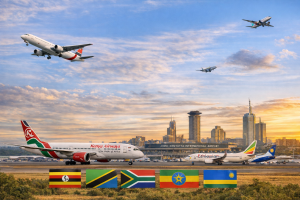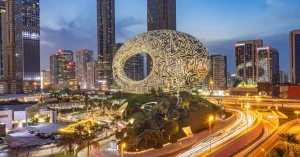
RwandAir has fortified its regional and continental position through the recent incorporation of two Boeing 737-800 jets. Renowned for its proactive approach to fleet modernisation, the carrier formally inducted the first of the pair at the commencement of the month, with the second delivered late last evening. This strategic expansion stands as a pivotal component of the airline’s overarching vision, which seeks to bolster intra-Africa and intercontinental linkages while elevating overall passenger convenience.
Configured to accommodate 174 travellers, the 737-800s are expressly calibrated to supplement short- to medium-haul operations. Deployment of the new aircraft will amplify frequency and augment capacity along critical regional corridors, the scope of which extends to nodes across Africa, the Middle East, and selected European cities. By integrating these technologically advanced airframes, RwandAir aspires to satisfy rising passenger volumes while simultaneously refining the journey for corporate and leisure clientele alike.
Enhancement of Passenger Experience and Route Accessibility
RwandAir’s integration of the Boeing 737–800 into its fleet represents a considered initiative aimed at elevating both comfort and procedural reliability for its customer base. The aircraft is configured with a balanced cabin of business and economy class seats, delivering increased adaptability for passengers engaged in transit across short to medium sectors. The refurbished interior—among the first to feature the Boeing Sky Interior—improves the journey environment through soft, variable illumination, expanded cabin stowage, and configuration choices that maximise accessible leg and shoulder room.
Central to the aircraft’s customer enrichment strategy is a state-of-the-art cabin connectivity system, responding directly to the surging expectation for robust, uninterrupted, high-speed data service. By provisioning comprehensive, flight-long internet coverage, RwandAir acknowledges the modern traveller’s need to remain digitally present, and its corresponding capital deployment acknowledges and in fact capitalises on prevailing international operational benchmarks. Equally, the carrier’s commitment to contemporary service provisioning affirms the broader ambition of establishing reliable service characterised by both passenger comfort and high procedural effectiveness.
The projected expansion of the RwandAir fleet is anticipated to create substantial favourable externalities for regional tourism, particularly within the East African corridor and the continent at large. By augmenting the frequency and seat availability on strategically selected routes, the carrier enables travellers to avail themselves of more adaptable itineraries and to gain seamless entry to regional nodes. Such enhancements are projected to catalyse an upsurge in visitor arrivals, thereby underpinning tourism-sector growth in Rwanda while simultaneously cascading benefits to bordering destinations.
The country, celebrated for its striking topographies, diverse fauna, and rich cultural patrimony, is thereby poised to achieve higher visitor counts facilitated by simplified access. Kigali, the nation’s administrative and commercial capital, is systematically evolving into an East African aviation hub; the anticipated connections will further entrench its position as an indispensable entry and transitory gateway for both regional and intercontinental travellers. Guests will be able to proceed from the capital to Rwanda’s signature attractions, particularly the Volcanoes National Park, which secures the largest remaining population of the endangered mountain gorilla, as well as to the country’s other notable ecological and cultural jewels.
RwandAir’s network currently includes 28 destinations across 22 countries—extending from Africa through Europe and into the Middle East and Asia. The airline’s systematic fleet expansion is a deliberate component of a wider initiative designed to broaden operational coverage and enhance the passenger journey. As RwandAir incorporates additional Boeing 737-800s into service, passengers can anticipate a more varied choice of flights and schedules that align more closely with their preferences.
These aircraft will focus principally on regional and intra-continental services. RwandAir plans to reinforce its frequencies on strategically identified markets—Nairobi, Johannesburg, Dubai, and Addis Ababa—where demand is strongest. Enhanced capacity promised by the 737-800 will furnish both corporate and leisure clientele with dependable and expedient air service across the African landscape.
RwandAir’s measured growth is occurring at a watershed juncture for African aviation, as the continent methodically rebounds from the disruptive effects of the COVID-19 pandemic. The integration of new-generation aircraft within its fleet is both an emblematic and a functional endorsement of revitalising regional demand. It underscores the escalating role that safe, dependable air links play in catalysing intra-continental and global tourism, thereby contributing to broader recovery and growth imperatives across the sector.
Conclusion
RwandAir’s ongoing modernisation of its fleet exemplifies a deliberate strategic alignment of the airlines within the African continent, which is directing capital towards the acquisition of advanced, fuel-efficient models that deliver both sustainability dividends and elevated passenger comfort. This forward-looking procurement program is indelibly linked to the carrier’s wider imperatives of bolstering tourist appeal, reinforcing intra-African linkages, and providing a clear catalyst for the systemic development of the continent’s aviation landscape.
Against a backdrop of rapidly rising demand for seamless connectivity across Africa and globally, the anticipated expansion of RwandAir’s operating capacity—coupled with the introduction of cutting-edge Boeing 737-800 aircraft—positions the carrier to respond effectively to the diverse demands of the contemporary traveller. Whether the journey is for corporate purposes, leisure exploration, or organised tourism, modern jets are specifically configured to elevate cabin service, extend geographic reach, and underpin the long-term value proposition that the airline seeks to establish within an emerging yet increasingly competitive African air transport arena.
Source: travelandtourworld.com



